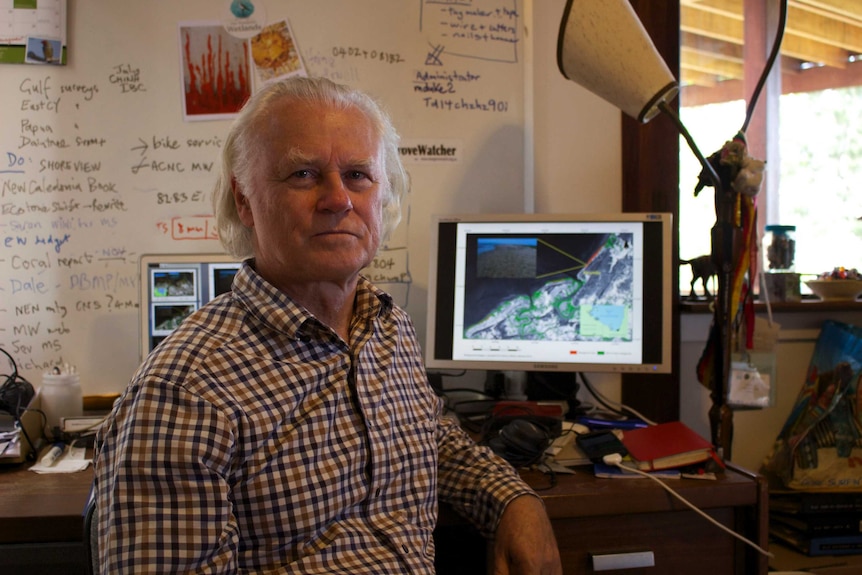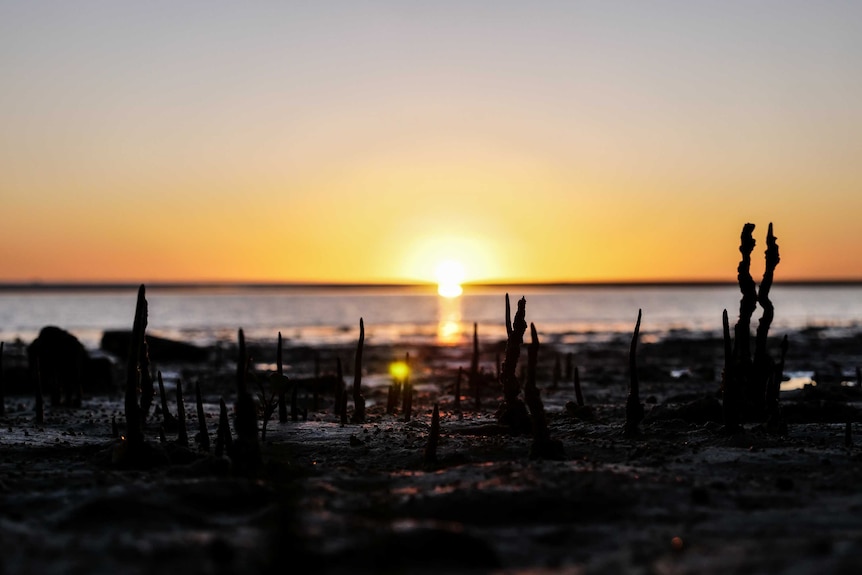Gulf of Carpentaria the 'poor cousin' of Great Barrier Reef in climate change action
ABC North West Qld /
By Kemii Maguire
Posted Yesterday
Hundreds of kilometres of mangroves in Queensland's Gulf Country have turned a ghostly white.( Supplied: James Cook University)
While attention has focused on the Great Barrier Reef this week, scientists warn Gulf of Carpentaria mangroves are also being devastated by the effects of climate change.
While attention has focused on the Great Barrier Reef this week, scientists warn Gulf of Carpentaria mangroves are also being devastated by the effects of climate change.
Key points:
Mangrove dieback in the Gulf of Carpentaria is being overlooked in climate discussions
Scientists say devastation in the Gulf directly correlates to Great Barrier Reef bleaching
Calls for better appreciation of climate change impact on mangroves
The World Heritage Committee, which sits under UNESCO, has proposed moving the Great Barrier Reef to the 'in danger' list because of the impact of climate change.
Mangrove ecologist Norman Duke from James Cook University (JCU) said while mangroves did not carry the same classifications as the reef, the climate change impacts were comparable.
"They go hand in hand," he said.
JCU researchers studying the Queensland Gulf region found more than 7,500 hectares of mangrove dieback since 2015.
"Weather conditions were not only enough to heat up the water and bleach the Great Barrier Reef, but it also has meant significant changes for mangroves," Dr Duke said.
"In this case, the mangroves have died from a lack of water and rain, but the events are synchronous, and that's the point."
7,500 hectares of mangroves have died in the Gulf of Carpentaria at Karumba.
(ABC North West Queensland: Lucy Murray)
Despite the severity of the dieback, no specific endangered or environmental listing had been applied to the Gulf of Carpentaria.
"What is currently happening with the Great Barrier Reef is because it is World Heritage-listed," Dr Duke said.
Unlike the Barrier Reef, which had federal government and global responsibility, the Gulf's environmental condition was controlled by local and state governments.
"The Queensland government has a general rule for mangrove disruption and the Northern Territory have their own rules," he said.
Mangroves not as controversial

Despite the severity of the dieback, no specific endangered or environmental listing had been applied to the Gulf of Carpentaria.
"What is currently happening with the Great Barrier Reef is because it is World Heritage-listed," Dr Duke said.
Unlike the Barrier Reef, which had federal government and global responsibility, the Gulf's environmental condition was controlled by local and state governments.
"The Queensland government has a general rule for mangrove disruption and the Northern Territory have their own rules," he said.
Mangroves not as controversial
Dr Norm Duke has been mangrove ecologist for more than 38 years.
(ABC Gold Coast: Ashleigh Stevenson)
The Barrier Reef's in danger listing saw a major backlash from politicians and local tourist operators.
Dr Duke said he had not found the same response to mangroves.
"Curiously enough, when people walk up to me the questions they ask is more about their concern with the mangroves," he said.
"It's not like they're saying nothing's happening and why we should be worried.
"Usually it's because something has happened and they want it explained.
"They simply need to know if they should be worried about it."
He said that climate discussions are not restricted to the Great Barrier Reef or coastal areas.
"We'd would encourage more appreciation for what these changes are, so we can better manage them."

The Barrier Reef's in danger listing saw a major backlash from politicians and local tourist operators.
Dr Duke said he had not found the same response to mangroves.
"Curiously enough, when people walk up to me the questions they ask is more about their concern with the mangroves," he said.
"It's not like they're saying nothing's happening and why we should be worried.
"Usually it's because something has happened and they want it explained.
"They simply need to know if they should be worried about it."
He said that climate discussions are not restricted to the Great Barrier Reef or coastal areas.
"We'd would encourage more appreciation for what these changes are, so we can better manage them."
Mangroves grow close to tourist hotspots including Karumba in the Gulf of Carpentaria.
(ABC News: Kelly Butterworth)
Dr Duke said the four-year-study into Gulf of Carpentaria mangroves would be released in the next coming weeks.
"There will be a lot of significant results that will be worth hearing about for people in the Gulf," he said.
"It's definitely a watch this space."
Dr Duke said the four-year-study into Gulf of Carpentaria mangroves would be released in the next coming weeks.
"There will be a lot of significant results that will be worth hearing about for people in the Gulf," he said.
"It's definitely a watch this space."
No comments:
Post a Comment